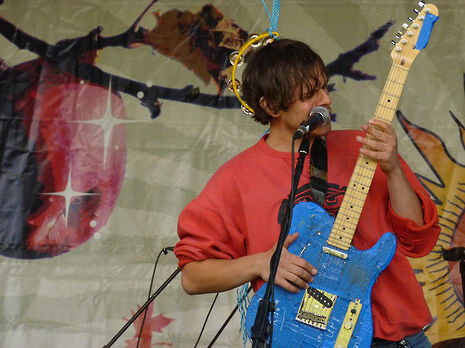Little Comets: The Potentialities of Song
Ahead of their visit to Cambridge, Young Sun Park discusses the creative genius of indie rock trio Little Comets

The raw, syncopated vocal qualities of Rob Coles, lead singer of Little Comets, were a strange thing to be mimicking outside a school cafeteria in 2009. I was lucky enough to have a few friends introduce me to the band that year at my young age, when the band was equally as young in its journey. Since then, their music has grown to be a steady counterweight to the repetitive beats employed by pop singers, and the ephemeral subject dealings of other alternative musicians for an ever-growing base of enthusiastic followers. Earlier this week, with two albums and five EPs tucked happily behind them, the trio released their third album, Hope is Just a State of Mind.
Each of the 12 tracks on the new album reaffirm an inclination that can be traced back to the band’s inception but that has grown stronger with time. This inclination is towards exploring all that a song—despite its short, non-interactive, and overexposed form—might be able to accomplish in terms of engaging social and personal discussion without compromising musicality, and vice versa. It is this which lends the band’s talent a special and modern kind of poignancy.
There are many things about the way the Little Comets approach writing and playing songs that encourages listeners to stop and think. For starters, the intense lyricism of each song. What might ostensibly seem like a sprinkling of pompous words – 'abrogate', 'taciturn', and 'savoir-faire' all make an appearance – are actually part and parcel of an approach to writing lyrics that treats the weight of words in a song as heavily as the weight of words on paper. There is a poetic quality that grabs you when you least expect it. Moments like, "Hope is looking skyward/Labour now a byword" in the song 'W-O-E', or "Her love is expiring while he sits perspiring/Just playing out time" in the song 'Adultery', are striking as much for their lyrical style as their expression in accented riffs.
On the other hand, there is the matter of being unable to clearly make out the words as Rob sings them. A rare instance of when this works, the necessity of listening to a song a few times before understanding every lyric is provoked less by vocal muddiness as by the distinct clarity of words sung in overflowing beats. That is, the lyrics fit onto melodies in lyrical enjambments, wherein the words ‘sages’ and ‘surprised’ might hinge over in prolonged tenor in songs like 'Coalition of One'. No less important to the variety of factors that make each song stick are the wide-scale guitar and colourful bass melodies, the kitchen-sink percussions, and the textured backing vocals. Disparate parts come together naturally, without any sign of over production.
Most importantly, however, is the fact that the lyricism and musicality of Little Comets come together to express much-needed reactions to the uninspiring political environments and regressive cultural trends of today’s society. Taking a different approach from the intense poetry of Leonard Cohen, the preaching visions of John Lennon, or the riotous activism of ‘anti-establishment’ bands, songs from the Little Comets tend to be earnest questionings of misogynist attitudes, corrupt political behaviour, and denials to the welfare state — and the arresting feeling of hopelessness produced by all of these in society.
Sometimes the questioning is done in a passionate manner, calling out policies and politicians as in the songs 'B&B' and 'Darling Alistair'; sometimes the questioning is done in an interior fashion, as in 'Woman Woman'. Most epically, the questioning is done subversively, as in 'The Blur', 'The Line' and 'The Thickest of Onions' — a song about complacent attitudes towards real problems of inequality and discrimination. The song was first released around the time 'Blurred Lines' by Robin Thicke was popular, and on top of the critique of big industry and empty cultural production, lies a probing question at the centre: "Why empower misogyny while violence towards women grows?"
None of this approach to songwriting comes without a certain self-awareness — usually of the self-deprecating kind (see song 'Formula') — from the part of the musicians themselves. Rob, Mickey, and Matt are aware of the powerful gift of sound (see song with corresponding title), and the more powerful privilege of platform. Listening to the songs of Little Comets has the effect of reading an extremely personal memoir or watching an authentically moving play — come the last pages of the book or the curtain call, you feel deeply connected the artists whilst wondering about the experiences and rehearsals you were never actually part of. Little Comets’ upcoming tour promises to be an opportunity to share even more closely the experiences of a band that realise so wholly the great potential of a song.
Little Comets appear at The Cambridge Junction this Tuesday, 24th February
 News / Fitz students face ‘massive invasion of privacy’ over messy rooms23 April 2024
News / Fitz students face ‘massive invasion of privacy’ over messy rooms23 April 2024 News / Climate activists smash windows of Cambridge Energy Institute22 April 2024
News / Climate activists smash windows of Cambridge Energy Institute22 April 2024 News / Copycat don caught again19 April 2024
News / Copycat don caught again19 April 2024 News / Emmanuel College cuts ties with ‘race-realist’ fellow19 April 2024
News / Emmanuel College cuts ties with ‘race-realist’ fellow19 April 2024 Comment / Does Lucy Cavendish need a billionaire bailout?22 April 2024
Comment / Does Lucy Cavendish need a billionaire bailout?22 April 2024





